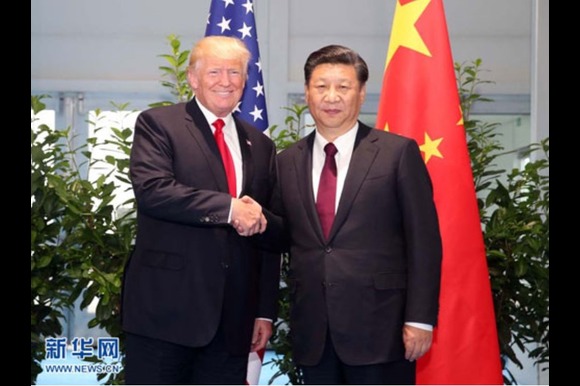The United States and China have reached a tentative framework for a potential trade deal, which will be discussed in detail when Presidents Donald Trump and Xi Jinping meet later this week, US Treasury Secretary Scott Bessent has announced.
Speaking to CBS, Bessent confirmed that the framework includes a “final deal” concerning TikTok’s US operations and an agreement for China to defer its tightened controls on rare earth mineral exports.
He also stated that he does not expect the 100% tariff on Chinese goods threatened by President Trump to take effect, while China is preparing to resume substantial purchases of American soybeans.
The agreement signals a major step toward easing tensions in the long-running trade war between the world’s two largest economies. Trump and Xi are scheduled to hold direct talks on Thursday in South Korea.
Constructive Talks in Malaysia
Bessent held talks with senior Chinese trade officials on the sidelines of the ASEAN Summit in Malaysia, attended by Trump as part of his week-long Asia tour. Beijing described the discussions as “constructive,” while Bessent said both sides had “reached a substantial framework for the two leaders”, emphasizing that “the tariffs will be averted.”
A statement from the Chinese government confirmed that both negotiating teams “reached a basic consensus on arrangements to address their respective concerns”, and agreed to “further finalise specific details.”
Trump’s Tariff Tactics and the Path to a Deal
Since returning to the White House, President Trump has made sweeping use of tariffs as a key instrument of his trade strategy, claiming they would help revitalize US manufacturing and protect American jobs. The policy has led several nations, including the UK, to negotiate new trade deals with Washington.
However, China has borne the brunt of Trump’s tariff policies, responding with retaliatory measures of its own. While both sides had previously paused tariff implementation to pursue talks, tensions escalated earlier this month when Trump vowed to impose an additional 100% tariff on Chinese imports starting in November, accusing Beijing of “hostility” and of attempting to hold the world “captive” by restricting rare earth exports.
China, which processes about 90% of the world’s rare earth minerals, has used its dominance in this market—vital for producing electronics such as smartphones and solar panels—as a powerful negotiating tool. When Beijing tightened export controls earlier this year following new US tariffs, US manufacturers raised alarm over potential supply disruptions.
Bessent confirmed that China will delay its rare earth export restrictions for one year to allow for further review, describing the move as a key confidence-building step.
Soybean Trade Set to Resume
Another major breakthrough appears to be on the resumption of US soybean exports to China, which were halted amid the escalating trade dispute. China, the world’s largest buyer of soybeans, had previously boycotted US supplies, devastating American farmers.
Bessent, himself a soybean farmer, told ABC’s This Week that the issue had been resolved in principle. “I’ve felt this pain too,” he said. “I believe when the announcement of the deal with China is made public, our soybean farmers will feel really good about what’s going on for this season and the coming seasons for several years.”
TikTok Agreement Ready for Leaders’ Approval
Another central element of the trade framework is a finalised deal regarding TikTok’s US operations, which Bessent said would be formally signed off by Trump and Xi during their Thursday meeting.
The US government has long sought to separate TikTok’s American business from its Chinese parent company, ByteDance, over national security concerns. The app had been ordered to sell its US assets or face a potential ban, though Trump extended the enforcement deadline four times to allow for negotiations.
Under the new arrangement, US companies will control TikTok’s algorithm, and Americans will hold six of seven board seats for the US branch.
Trump, who initially called for the platform’s outright ban during his first term, has since embraced it as a tool for engaging younger voters, using it actively during his 2024 campaign.
Broader Regional Trade Initiatives
Beyond China, the US administration announced a series of new trade agreements with Southeast Asian nations, including Malaysia and Cambodia, along with framework accords with Thailand and Vietnam.
The region, heavily dependent on trade with the United States, has been among the most affected by Washington’s tariffs. While the US will maintain a general tariff rate of up to 20% on imports from these countries, certain product-specific exemptions may apply.
“Our message to the nations of South East Asia is that the United States is with you 100%, and we intend to be a strong partner for many generations,” Trump declared in Malaysia, the first stop on his Asian tour.
Trump also signed agreements on critical minerals with Thailand and Malaysia, expanding US access to rare earth elements and strategic metals outside of China’s control. Meanwhile, Vietnam and the US unveiled “unprecedented” trade access measures, with Vietnam agreeing to purchase Boeing aircraft worth more than $8 billion, along with American agricultural goods.
A Turning Point in US-China Relations
The emerging trade framework—covering issues from TikTok to rare earths and agriculture—represents the most significant step toward de-escalation since the latest round of tariff threats. If finalised, the deal could mark a new phase of economic cooperation between Washington and Beijing, even as both sides continue to navigate a complex geopolitical rivalry.
Bessent summarized the progress optimistically: “We have laid the foundation for stability and growth. The tariffs will be avoided, and both countries are showing goodwill to move forward.”






